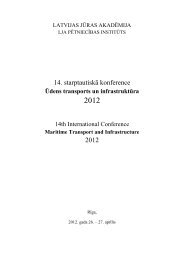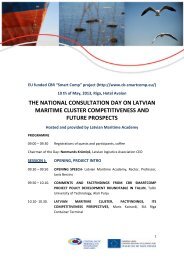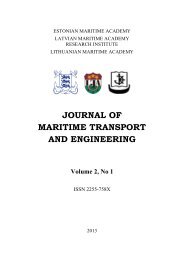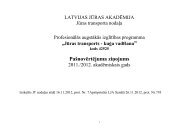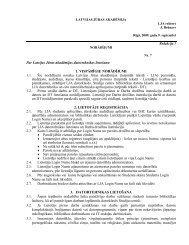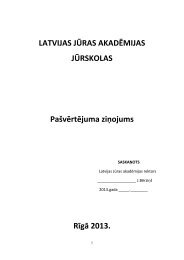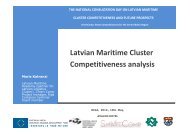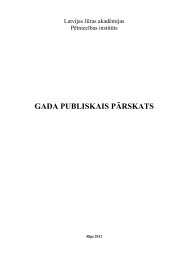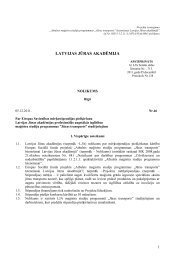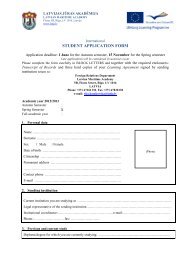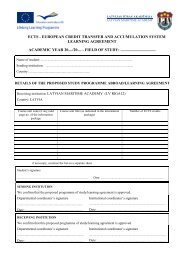Latvian Maritime academy
Latvian Maritime academy
Latvian Maritime academy
You also want an ePaper? Increase the reach of your titles
YUMPU automatically turns print PDFs into web optimized ePapers that Google loves.
SHOULD COMPETENT SEAFARER BE EDUCATED?<br />
LEGISLATIVE CORRESPONDENCE BETWEEN LEVELS OF<br />
COMPETENCE AND LEVELS OF EDUCATION<br />
Viktoras Senčila<br />
Lithuanian <strong>Maritime</strong> Academy, 7 I. Kanto Street, Klaipeda, LT-92123, Lithuania,<br />
E-mail: v.sencila@lajm.lt, phone: +370 46397240<br />
Abstract<br />
Regardless of unified international requirements for maritime education and training, national MET<br />
systems differ in academic level, content, duration of study programmes and consequence of school and<br />
sea time during these programmes. The requirements for competencies of seafarers are set by the<br />
international convention STCW 78 as amended in 2010, but the convention does not specify requirements<br />
for levels of adequate education. Therefore, question “Should competent seafarer be educated and what<br />
level of education is necessary?” rises again and again. Otherwise national MET systems of the EU<br />
countries should be in compliance with legislation of European educational area. In this relation<br />
European Qualifications Framework, adopted in 2008, could serve as a translation device between<br />
different qualifications systems and their levels. The analysis of STCW 78 and European Qualifications<br />
Framework reveals clear correspondence between levels of seafarers’ competence and adequate levels of<br />
education.<br />
Keywords: MET, seafarer, level of competence, level of education<br />
Introduction<br />
Regardless of unified international requirements for maritime education and training, great variety<br />
of national MET systems has formed historically and it still exists.<br />
The requirement for competences of seafarers are set by the International Convention on Standards<br />
of Training, Certification and Watchkeeping for Seafarers (STCW 78) as amended in Manila in 2010 [12]<br />
and for EU countries additionally requirements are set by Directive 2008/106/EC on the minimum level<br />
of seafarers’ training [3]. The above mentioned Convention and the Directive do not set any requirements<br />
for adequate levels of education for seafarers. Therefore, the question “Should competent seafarer be<br />
educated, what level of education is sufficient?” rises again and again [1, 2].<br />
National MET systems are linked and supervised by both national maritime administrations and<br />
national educational authorities. Consequently, MET systems should be in compliance with the<br />
requirements for seafarer’s professional competence and with the requirements for educational level as<br />
well. The link “Competence level – Level of education” could be a key equivalence for MET system<br />
harmonization with professional and educational requirements.<br />
In 1999 the Bologna process was launched by 30 countries to create convergence between higher<br />
education systems. The countries participants of Bologna process transformed their national higher<br />
education systems to recognisable for common European area, the system of three sequential levels<br />
(cycles) of higher education qualifications: “Short cycle (pre or entry level)-Bachelor-Master-Doctor”<br />
[11].<br />
The European labour market, as any other, cannot function effectively without common reference to<br />
the recognition of qualifications. The need for European qualifications framework became obvious after<br />
Lisbon treaty was signed [6]. The European Qualifications Framework was formally adopted in 2008 and<br />
aimed to contribute to modernising education and training systems for better interrelationship of<br />
education, training and employment [4].<br />
The analysis of legislative requirements and recommendations for seafarers’ levels of competence<br />
and adequate levels of education was performed; the conclusions and recommendations are presented in<br />
the article.<br />
Variety of national MET systems<br />
National MET systems differ in academic level, duration and consequence of MET programmes<br />
leading to unlimited certificate of competency [5, 9] and there is not common opinion about sufficient<br />
level of education for marine officers. It is still unclear what level of education is adequate for<br />
41



